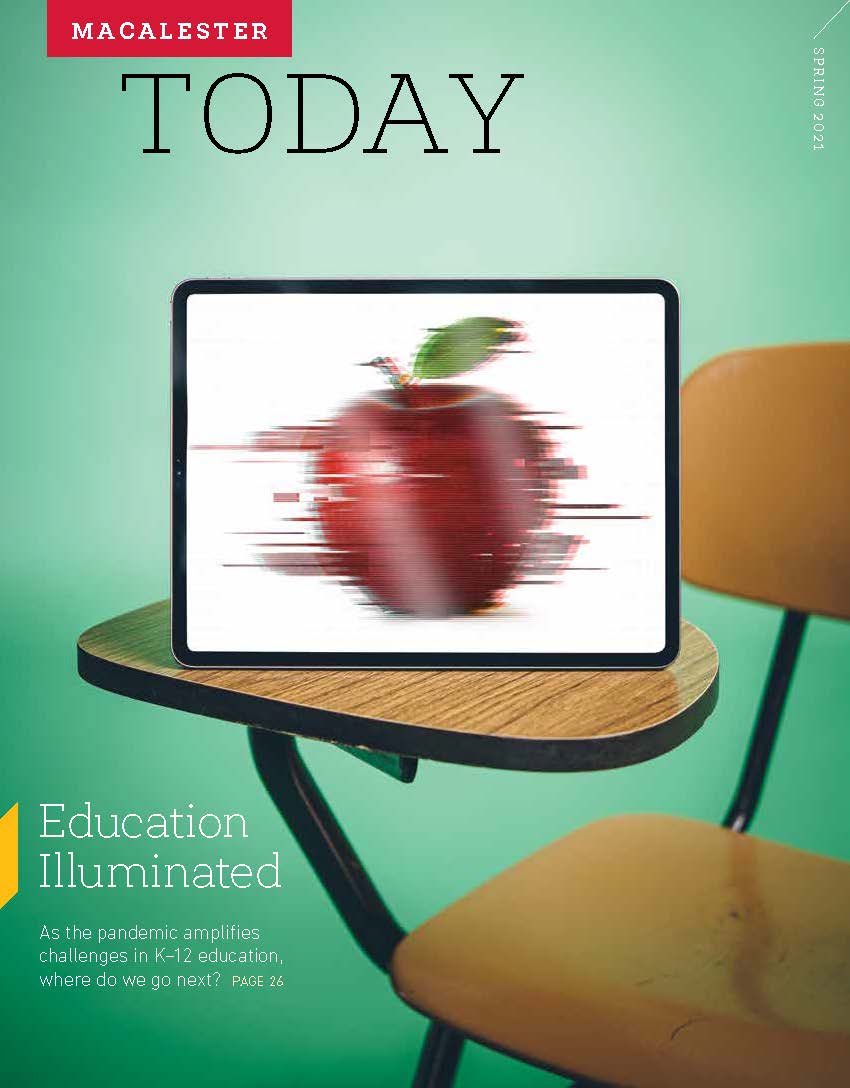
By Mandi Masden ’08 / Illustration by Simone Martin-Newberry
Last summer after George Floyd was killed, theater professor Harry Waters Jr. looked out his Minneapolis window and saw Lake Street on fire amid the uprising. When he began to think about teaching that fall, he knew his syllabus needed to change. “I didn’t just want to do a course about reading some plays,” Waters says. “The community I’m part of is mourning and grieving and angry, and I needed to celebrate the positives. I really wanted us to investigate some of the documented theatrical history that led us to this moment.” We asked him about “Living, Making, Celebrating Black History Through Theater,” the course that emerged from that reflection.
What opportunity does this moment create to investigate our contributions to and expansion of American theater and history?
This class looks at the Black experience in America through the lens of Black playwrights and Black plays, and grounds us in an understanding of what the Black theater community creates in response to history. These plays were all written in response to their time periods, and all of them talk to each other in a certain way. In asking my students how these plays speak to them, and investigating them through the lens of history, we’re having a different kind of discussion about the text and also about Black culture. Essentially it’s an American history course, and we’re teaching them a different way of accessing the histories, and looking at the ways Black people are telling stories and redefining forms within that history.
What texts and resources do you use to facilitate this type of work?
Before I ask students to write anything about their experience reading Black plays, they need to have a grounding in Black images and that historical grounding in the United States. One of the first things we did was watch the 1987 documentary Ethnic Notions, which everyone should own because it gives you the visual imagery and historical context of how Black people are dehumanized in this society. In the beginning, they also read The Dutchman, by Amiri Baraka; For Colored Girls…, by Ntozake Shange; and A Raisin in the Sun by Lorraine Hansberry—so you’ve got three different eras, three different writers, three different storytelling techniques. They offer so much information, and they each ground you in the history of the time. We look at the various ways that Black folks are telling stories that are different: What does it mean when it’s this particular body that is creating and telling?
How does a theatrical approach to this “grounding” differ from regular text analysis?
With Day of Absence by Douglas Turner Ward, for example, I had everybody make a white mask by cutting a paper plate in half. The play is about Black actors in white face, and as we read the play aloud in class, it added another layer that’s part of how students are learning experientially about racial dynamics. It’s not about making anybody feel guilty or telling anyone how to feel. It’s about facilitating an experience in community, so no one is outside of it, wondering alone “What do I do?” It’s creating something no one has to disappear from, because we are in it together. That’s acting, that’s ensemble: you are working from your body—you are the material, you are the research—so how are we using it, or how is it available? I want students to know they are a community capable of building experiences that can move them forward in unexpected ways.
Theater classes are particularly hands-on and physically interactive spaces. How do you build community in remote instruction?
I offer a prompt and send students to Zoom breakout rooms, where they talk about characters, writers, the era, what spoke to them and why, what they found revealing or disturbing. Then they come back not only with a reflection on the text, but with a performance based on what they experienced with it. It allows them to have a communal experience with each other and share with the larger group, so everyone’s learning from each other’s experiences instead of me just lecturing about it. That way they’re going deeper into the readings and learning how to tell a story that’s experiential, instead of just reporting on the assignment. We’re not doing play analysis—we’re doing an experiential analysis.
How are you finding joy during this time?
I find it in community. I’m not a playwright or a novelist that can sit alone just writing. For me there’s something about the collaborative process that is always open to possibility in a different way. Knowing the exact outcome isn’t really interesting to me, because then we’re just going from “Okay, how do we do that?” to “Okay, we did that.” It’s similar to being in rehearsal when each moment is about discovery: finding what works, what doesn’t work, discovering something completely unexpected. That’s what brings me joy.
You’re retiring from teaching this spring. How has Mac prepared you for the next step?
I’m still connected to so many Macalester graduates who are working in the Twin Cities, and that’s a gift I did not know was going to happen. They’re doing their own thing now, and it’s still peripherally connected to what I do and what we did together in the classroom—I just worked on a piece with a recent grad who is a sound designer. Macalester gave me access to an amazing artistic community. These communities created magic, and I got to help facilitate that. I want a picture of me like Obama, just dropping the mic.
Mandi Masden ’08 is an actor, writer, and entrepreneur based in Brooklyn, N.Y. Harry Waters Jr. was her teacher and advisor at Mac.
April 23 2021
Back to top





